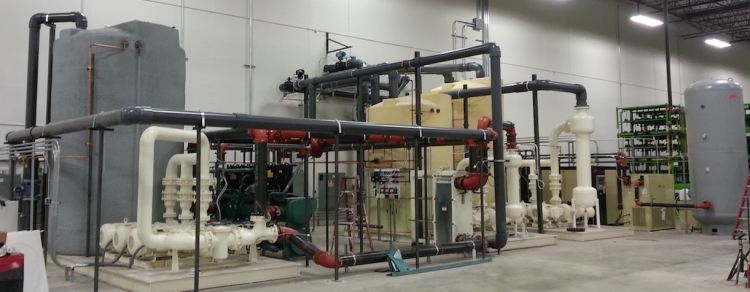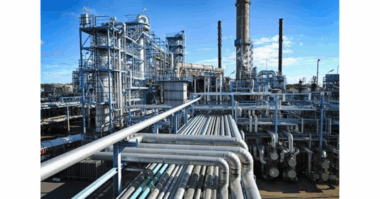Background
Detroit Thermal Systems (DTS) develops and manufactures high quality climate control systems and components for the automotive industry. The company utilizes state-of-the-art technology and exceptionally high manufacturing standards to produce heating, ventilation and air conditioning (HVAC) systems in its metro Detroit facility. DTS is a leading minority owned automotive company and is certified as a Minority Business Enterprise.
As part of their year-one growth plan, DTS moved into a new facility, which allowed them expanded production capabilities. The new facility would use both revitalized injection molding equipment and new plastic handling equipment, which needed to be cooled. The system configuration was engineered from the ground up for the new facility, and thus, the cooling system had to be custom engineered to meet the new requirements.
Fluid Cooling Systems (FCS) was called in to engineer and quote this new process cooling system, which included equipment, pipe sizing, routing instrumentation, the control scheme, and a few extras.
Challenge
The original system’s cooling load wasn’t known because they were pulling from a large central chilled water source that was shared with another manufacturer. A new system was engineered, and a heat load needed to be defined. Based on the calculated flow, the on-site engineer had determined a cooling load of 300 tons, plus a redundant back up, for a total of 600 tons of cooling for the new system. However, FCS’s engineers were initially calculating a load of 110 tons.
Approach and Execution
To determine why there was a difference between their calculations and the DTS engineers, the FCS team first analyzed the numbers provided by the customer. They then determined the theoretical load based on the equipment and numbers provided by the customer. Lastly, they reviewed the specifications of all the manufacturing equipment and used their portable flow meter at the existing facility to determine the exact requirements. The FCS team also made a site visit to the new facility to take measurements and confirm their numbers were accurate.
After a thorough discovery, they determined that the DTS engineer had incorrectly calculated the temperature differential, which was only 2-3 degrees in this application. He had assumed a delta T of 10 degrees, which accounted for the large discrepancy in the heat load numbers. The FCS team then walked the customer through how they came up with the numbers to ensure he understood the methodology and was comfortable with the result.
FCS provided process diagrams as part of the full submittal, which included electrical and mechanical components. They took it one step further and helped define the mechanical scope for mechanical contractors to quote as part of the RFQ process.
Production and installation of the new process cooling system went without a hitch, and was implemented in two phases.
As an added bonus, there’s an integrated free cooling cycle, which utilizes the cooling tower during colder months. During full load in the spring, fall and winter Detroit Thermal Systems is able to save 183kW’s per hour. The facility runs 24/7 which equates to an estimated savings of $13,176 per month. When free cooling is in operation the chillers are shut down, saving wear and tear on the equipment and providing valuable down time for chiller maintenance and repairs.
Outcome
Detroit Thermal ended up with an innovative industrial design that’s expandable. It’s very efficient and customizable, and has a large operating envelope because of the robust design and variable frequency drives on fan and pump motors. The system was designed to scale up or down to meet changing demands. The best part is the DTS customers were educated during the process and didn’t over spend on a system that was overly robust.
Throughout the process, FCS worked with several different groups within DTS, including engineering, purchasing and maintenance; all with their own needs and desired outcomes.
In the end, FCS earned a lifelong customer that is appreciative of their thorough approach and high level of customer service.




